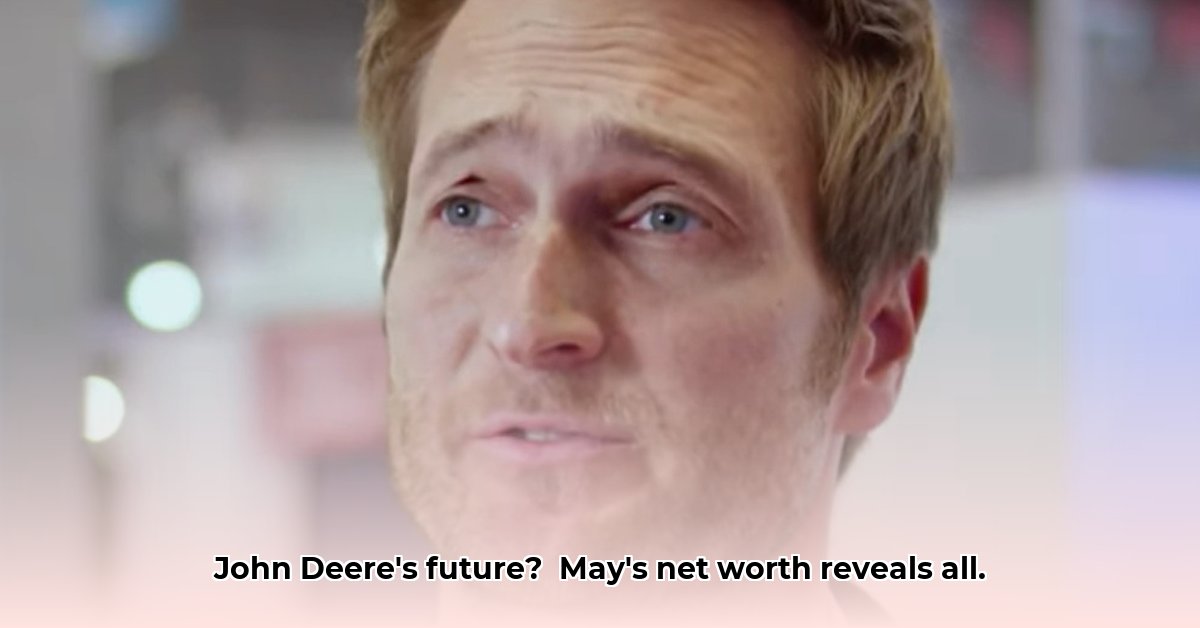
John C. May's substantial net worth, reflecting Deere & Company's financial success, raises questions about the company's commitment to sustainable agriculture. This article examines the relationship between May's leadership and Deere's sustainability initiatives, analyzing whether his compensation and management style contribute to the company's environmental goals. Does Deere's impressive progress in sustainable farming translate into a truly sustainable future, and how much of this success can be attributed to May's leadership? For more on May's finances, see his net worth.
May's Compensation and Deere's Sustainability Strategy
John C. May's 2020 compensation, totaling $14,753,774, underscores the high stakes in Deere's leadership and its position within the agricultural sector. However, this raises questions about the alignment between his focus on profitability and Deere's stated commitment to sustainability. Are these objectives inherently conflicting, or can they coexist successfully within Deere's overarching strategy? A balanced perspective is crucial.
Does a high executive compensation package necessarily equate to a strong commitment to the environment? Or could it signal a prioritization of shareholder value over long-term environmental impact? Further investigation is needed to fully understand the direct relationship between May's leadership and the company's sustainability investments.
The Complexities of Sustainable Agriculture
Deere faces the universal challenge of balancing short-term profits with long-term environmental sustainability. While May's compensation indicates the company's financial health, data directly connecting his leadership style to measurable sustainability outcomes remains limited. Available public information largely focuses on his compensation and general leadership approach, lacking granular details on his personal contributions to specific Deere environmental programs. This lack of transparency hinders a complete assessment of his role in Deere's sustainability journey.
Technology and Sustainability: A Double-Edged Sword
May's background as Chief Information Officer is noteworthy. Precision agriculture increasingly relies on data-driven technologies to minimize environmental impact and optimize yields. This technological expertise could be instrumental in guiding Deere's sustainability efforts. However, technological advancements are not inherently sustainable. Careful management is crucial to mitigate the potential environmental downsides of technological development and deployment. The impact of May's technological expertise on Deere's sustainability efforts remains to be seen. Will his background propel Deere towards greater sustainability, or might it inadvertently hinder progress?
Stakeholder Perspectives and Collaborative Action
Achieving a sustainable future requires a collaborative approach involving various stakeholders. Consider the following:
- Deere & Company: Needs clear sustainability reporting and targeted marketing campaigns highlighting their initiatives alongside robust R&D investment and strategic partnerships with environmental organizations. The challenge lies in balancing immediate profits with long-term sustainability investments.
- Investors: Demand greater transparency on ESG (environmental, social, and governance) performance and increased diversification into sustainable initiatives. The pressure to prioritize short-term financial gains over long-term sustainability poses a significant hurdle.
- Farmers: Require accessible and cost-effective sustainable technologies along with appropriate training and support to effectively utilize data-driven practices and reduce their environmental footprint. High initial investment and information gaps can deter adoption.
- Governments and NGOs: Need to create incentives and policies that encourage adoption and development of sustainable practices while collaborating with companies like Deere to implement policies and support research. Political pressures can interfere with the development of collaborative solutions.
Mitigating Risks and Ensuring a Sustainable Future
Deere faces several potential risks in its pursuit of sustainability:
- Failure to adapt to evolving sustainable farming trends: Mitigation requires increased R&D investment, proactive stakeholder engagement, and swift adoption of new technologies.
- Negative public perception of environmental practices: Transparency and prompt responses to concerns are essential in maintaining public trust.
- Increased competition in sustainable agricultural technology: Deere needs to develop innovative and differentiated solutions and build strategic partnerships to stay ahead.
- Regulatory changes in environmental law: Proactive engagement with policymakers and adaptable compliance programs are crucial to navigate evolving regulations.
Conclusion: Transparency and Innovation as Cornerstones of Deere's Future
Deere's success in its transition to a sustainable future depends critically on transparency and innovation. Open communication of sustainability efforts, significant investment in R&D, and proactive engagement with stakeholders are essential. John C. May's net worth reflects past successes, but Deere's legacy will ultimately be defined by its commitment to a greener future. Further research is necessary to fully assess May's leadership's impact on Deere's sustainability journey. The crucial question remains: Will Deere successfully lead the agricultural industry towards a more sustainable tomorrow?